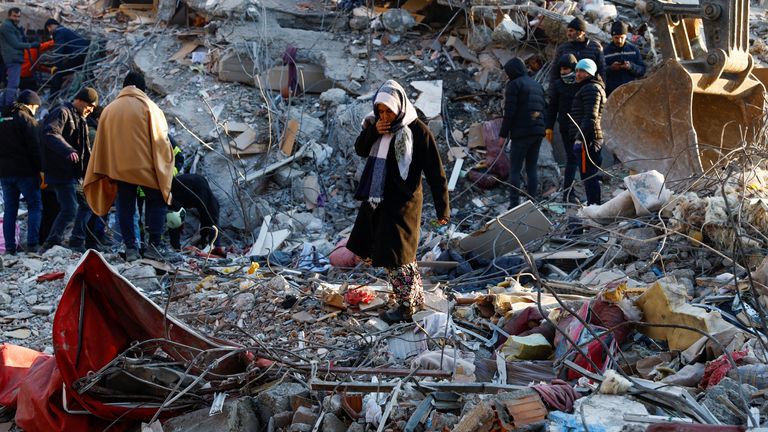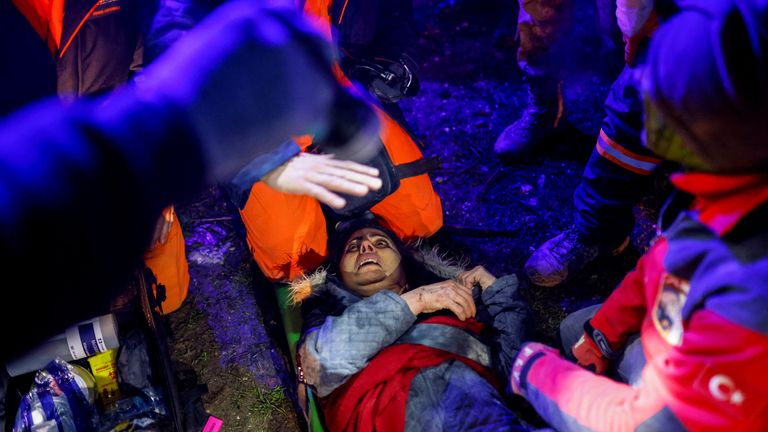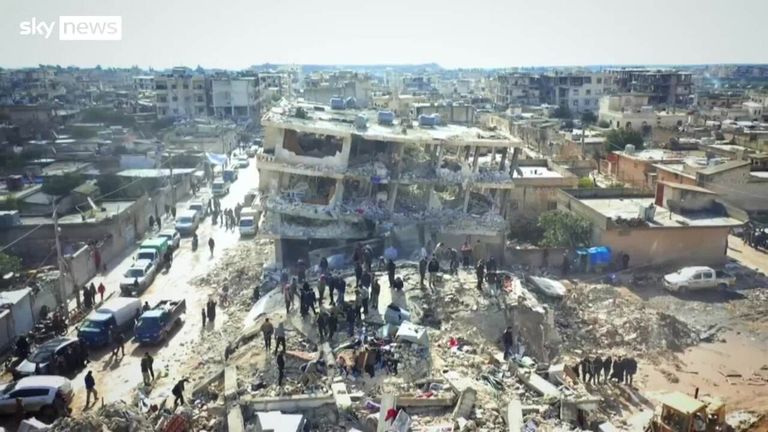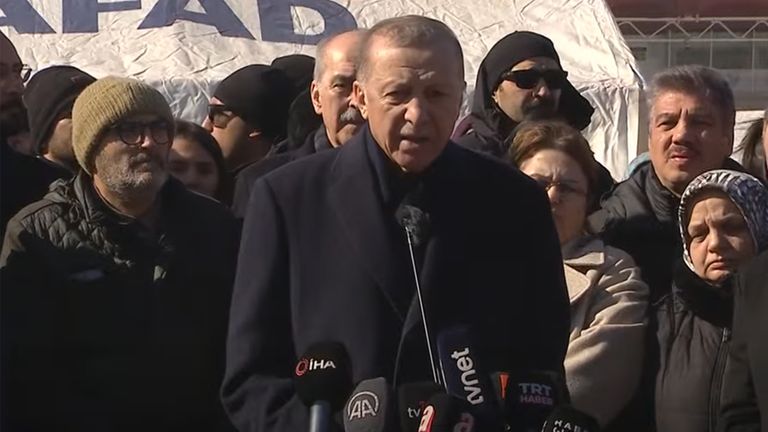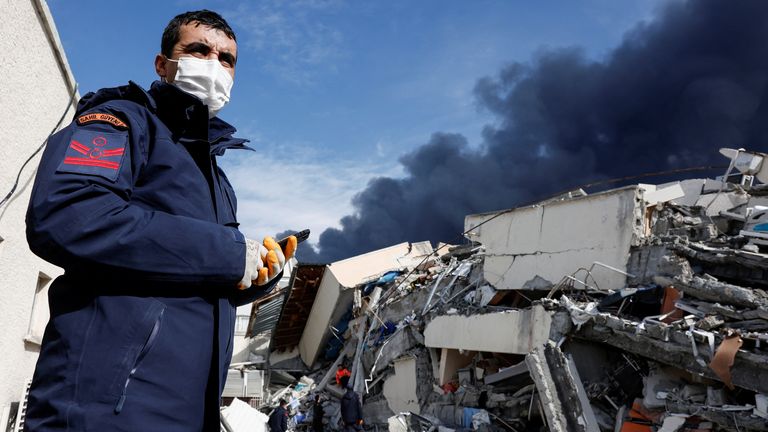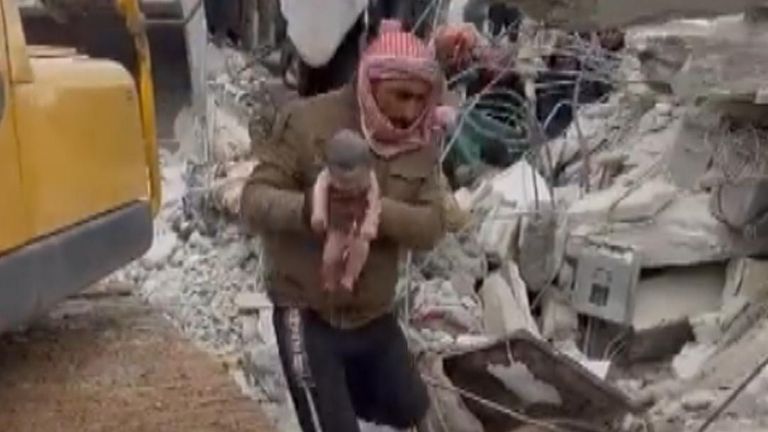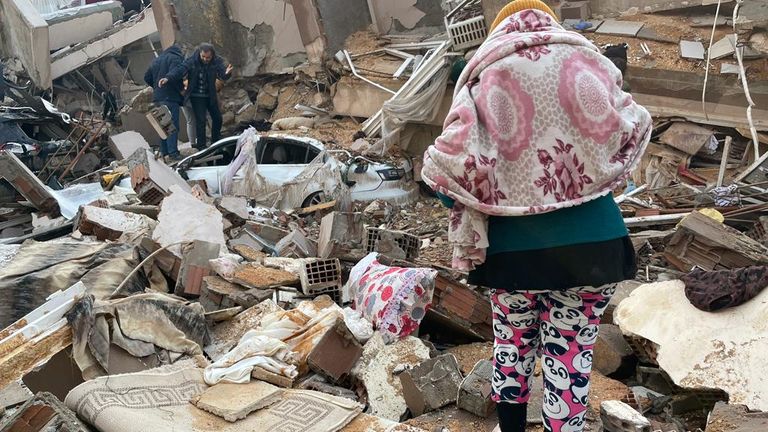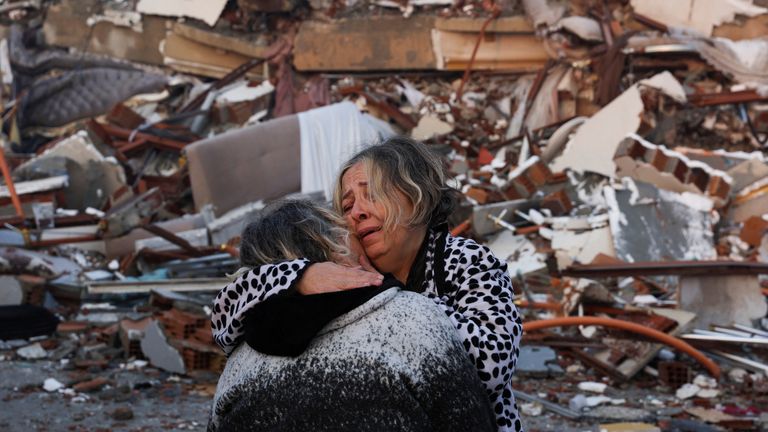More than 11,000 confirmed fatalities in Turkey and Syria in deadliest earthquake in over a decade
Rescue teams from around the world have travelled to both countries to help search for survivors. Meanwhile, the World Health Organisation says fatalities could reach as high as 20,000 in the coming days.
Wednesday 8 February 2023 12:00, UK
More than 11,000 people have died after devastating earthquakes rocked Turkey and Syria.
The first 7.8 magnitude earthquake happened before dawn on Monday, when many people would have been sleeping.
Rescue teams from around the world have travelled to both countries to help search for survivors.
Baby born under rubble makes it out alive - follow live earthquake updates
The World Health Organisation (WHO) has said fatalities could reach as high as 20,000 in the coming days.
Turkey's disaster management agency said the country's death toll passed 8,500 on Wednesday. The Syrian Health Ministry said the death toll in government-held areas has climbed past 1,200, while at least 1,400 people have died in the rebel-held northwest, according to volunteer first aiders known as the White Helmets.
That brought the overall total to 11,000 since Monday's earthquake and multiple strong aftershocks. Tens of thousands more are injured.
It is the deadliest since a 2011 earthquake in Japan triggered a tsunami, killing nearly 20,000 people.
As many as 23 million people could be affected in the quake-hit region, according to Adelheid Marschang, a senior emergencies officer with the World Health Organization, who called it a "crisis on top of multiple crises".
Turkish President Recep Tayyip Erdogan will travel to the town of Pazarcik, the epicentre of the earthquake, and to the worst-hit province of Hatay on Wednesday.
His visit comes amid calls for the government to send more help to the disaster zone.
Turkey has some 60,000 aid personnel in the earthquake-hit zone, but with the devastation so widespread many are still waiting for help.
Read more
Terrified and freezing, those left homeless from the earthquake travel for days to seek refuge
Heartbreak, horror and hope: Turkey and Syria after the earthquake in pictures
Gruesome, technical work: How an earthquake search and rescue mission is conducted
President Erdogan has said 13 million of the country's 85 million people were affected, and he declared a state of emergency in 10 provinces.
More than 8,000 people have been pulled from the debris in Turkey, and some 380,000 have taken refuge in government shelters or hotels, authorities said.
Nearly two days after the magnitude 7.8 quake struck southeastern Turkey and northern Syria, rescuers pulled a 3-year-old boy, Arif Kaan, from beneath the rubble of a collapsed apartment building in Kahramanmaras, a city not far from the epicenter.
With the boy's lower body trapped under slabs of concrete and twisted rebar, emergency crews lay a blanket over his torso to protect him from below-freezing temperatures as they carefully cut the debris away from him, mindful of the possibility of triggering another collapse.
The boy's father, Ertugrul Kisi, who himself had been rescued earlier, sobbed as his son was pulled free and loaded into an ambulance.
"For now, the name of hope in Kahramanmaras is Arif Kaan," a Turkish television reporter proclaimed as the dramatic rescue was broadcast to the country.
A few hours later, rescuers pulled 10-year-old Betul Edis from the rubble of her home in the city of Adiyaman in Turkey.
Her grandfather kissed her and spoke softly to her as she was loaded on an ambulance as onlookers applauded.
Meanwhile, residents found a crying newborn still connected by the umbilical cord to her deceased mother in a northern Syrian town on Monday afternoon.
The baby was the only member of her family to survive a building collapse in the small town of Jinderis, relatives told The Associated Press news agency.
But such stories were few, more than two days after Monday's pre-dawn earthquake, which hit a huge area and brought down thousands of buildings, with frigid temperatures and ongoing aftershocks complicating rescue efforts.
Many survivors in Turkey have had to sleep in cars, outside, or in government shelters.
Aysan Kurt, 27, said: "We don't have a tent, we don't have a heating stove, we don't have anything. Our children are in bad shape. We are all getting wet under the rain and our kids are out in the cold.
"We did not die from hunger or the earthquake, but we will die freezing from the cold."
Search teams from more than two dozen countries have joined the Turkish emergency personnel, and aid pledges poured in.
But with devastation spread multiple several cities and towns - some isolated by Syria's ongoing conflict - voices crying from within mounds of rubble fell silent, and despair grew from those still waiting for help.
Aid efforts in Syria have been hampered by the ongoing war and the isolation of the rebel-held region along the border in Syria.
The region is surrounded by Russian-backed government forces.
The United Nations said it was "exploring all avenues" to get supplies to the rebel-held northwest.
Syria itself is an international pariah under Western sanctions linked to the war. The region sits on top of major fault lines and is frequently shaken by earthquakes.

